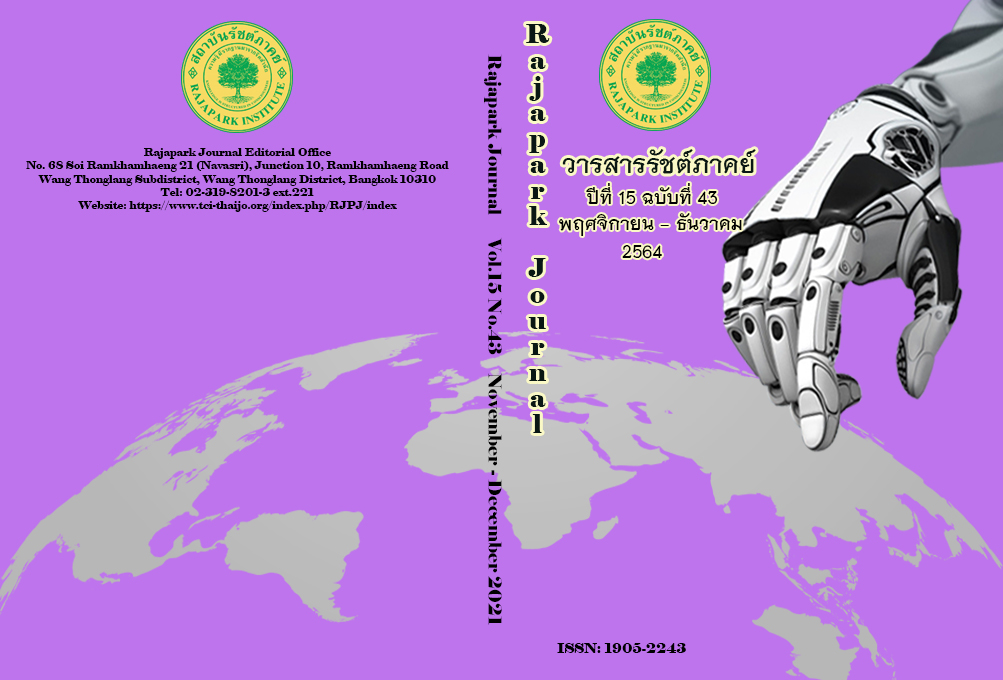Creating Citizen Consciousness of Students in Lopburi Province
Main Article Content
Abstract
The objectives of this research were to 1) provide the participants with knowledge and understanding of the meaning of citizens in a democratic system; 2) provide the participants with knowledge and understanding of the meaning of public policy, the public policy making process, and the implementation of policies; and 3) equip the participants with knowledge and understanding of citizenship building processes and apply them in solving community problems with participation. The sample group used in the research was students who attended the training on the Citizen Awareness Project of the Lopburi Provincial Administrative Organization. for fiscal year 2020, totaling 264 people. The instrument used for data collection was the behavioral observation form of the trainees. Data were analyzed using statistics, percentage, mean, standard deviation. The results of the research were as follows: 1. The students who attended the training on civic consciousness building had a better understanding of the meaning of civics, which accounted for 80%; 2. The students who attended the training on civic consciousness building had knowledge about public policy making processes and implementation of policies, which accounted for 70%; 3. The students who attended the training on civic consciousness building have knowledge and understanding of the citizenship process and are able to use it in solving community problems by 80%.
Article Details
Views and opinions appearing in the Journal it is the responsibility of the author of the article, and does not constitute the view and responsibility of the editorial team.
References
King Prajadhipok’s Institute. (2015). Public Administration and the Creation of Good Governance. Bangkok: King Prajadhipok’s Institute.
Kowtrakul, S. (2016). Educational Psychology (12th ed.). Bangkok: Chulalongkorn University.
Office for National Education Standards and Quality Assessment (Public Organization). (2014). Third Round of Quality Assessment Report (2009-2013) Basic Education Level. Bangkok: Author.
Paiboonthitipornchai, P. (2010). The Study of Good Citizenship of Students of Bang Bua Thong Commercial School, Nonthaburi(Master of Arts, Public and Private Management). Silpakorn University.
Pharcharuen, W. (2018). Characteristics of Good Citizenship in a Democratic Society of Students in Maejo University. MBU Education Journal: Faculty of Education Mahamakut Buddhist University, 6(1), 148-161.
Pornputtipong, W., Sukitjakorn, S., Thognaram, D. (2015). Perception of Good Citizenship Among Youth in Bangkok Area. Veridian E-Journal, Silpakorn University, 8(1), 1331-1339.
Prasomphet, S. (2020). Deputy Chief Executive of the PAO Lopburi. Interview, April 18, 2020.
Satararuji, K. (2008). The Lessons Learned from the Youths’ Group Communication Process Regarding Public Consciousness. Bangkok: Dhurakij Pundit University.
Satayanurak, S., & Tantisunthorn, T. (2012). The Thai Way and the Enhancement of Thai Citizenship. In the summary of the 13th King Prajadhipok’s Institute Conference of the Year 2011 on the topic of being Citizens and the Future of Thai Democracy, 4. Nonthaburi: King Prajadhipok’s Institute.
Surakitbowon, S., & Pengsawat, W. (2011). A Model of Effectiveness Development Management on Academic Affairs in Small Schools under the Office of Basic Education Commission. Sakon Nakhon Rajabhat University Journal, 3(6), 13-33.
Suksom, A. (2010). Public Consciousness Development for Communities. Bangkok: Dhurakij Pundit University.
Tantisunthorn, T. (2011) Citizenship Education. Bangkok: Educational Policy Institute.
Tiyao, B., Valaisathien, P., & Harmontree, W. (2019). Volunteer Spirit Movement: The Socialization of Youth Self-Development in Bangkok Metropolitan Region. Journal of MCU Peace Studies, 7(Sup), S67-S78.
Viphatphumiprathes, T. (2013). Democratic Citizenship of Dhurakij Pundit University Students (Research report). Dhurakij Pundit University.
Uwanno, B. (2010). People’s Participation in Public Policy Process. Nonthaburi: King Prajadhipok’s Institute.


